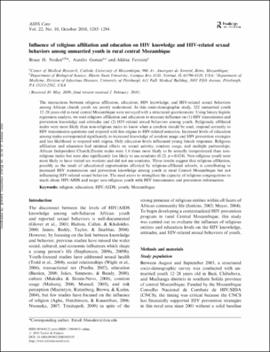| dc.contributor.author | Noden, Bruce H. | |
| dc.contributor.author | Gomes, Aurelio | |
| dc.contributor.author | Ferreira, Aldina | |
| dc.date.accessioned | 2022-04-12T13:56:01Z | |
| dc.date.available | 2022-04-12T13:56:01Z | |
| dc.date.issued | 2010-10 | |
| dc.identifier | oksd_noden_influenceofreligious_2010 | |
| dc.identifier.citation | Noden, B. H., Gomes, A., & Ferreira, A. (2010). Influence of religious affiliation and education on HIV knowledge and HIV-related sexual behaviors among unmarried youth in rural central Mozambique. AIDS Care - Psychological and Socio-Medical Aspects of AIDS/HIV, 22(10), pp. 1285-1294. https://doi.org/10.1080/09540121003692193 | |
| dc.identifier.uri | https://hdl.handle.net/11244/335204 | |
| dc.description.abstract | The interactions between religious affiliation, education, HIV knowledge, and HIV-related sexual behaviors among African church youth are poorly understood. In this socio-demographic study, 522 unmarried youth 12-28 years old in rural central Mozambique were surveyed with a structured questionnaire. Using binary logistic regression analysis, we used religious affiliation and education to measure influence on (1) HIV transmission and prevention knowledge and attitudes and (2) HIV-related sexual behaviors among youth. Religiously affiliated males were more likely than non-religious males to know when a condom should be used, respond correctly to HIV transmission questions and respond with less stigma to HIV-related scenarios. Increased levels of education among males corresponded significantly to increased knowledge of condom usage and HIV prevention strategies and less likelihood to respond with stigma. Only education levels influenced young female responses. Religious affiliation and education had minimal effects on sexual activity, condom usage, and multiple partnerships. African Independent Church/Zionist males were 1.6 times more likely to be sexually inexperienced than non-religious males but were also significantly less likely to use condoms (0.23, p=0.024). Non-religious youth were most likely to have visited sex workers and did not use condoms. These results suggest that religious affiliation, possibly as the result of educational opportunities afforded by religious-affiliated schools, is contributing to increased HIV transmission and prevention knowledge among youth in rural Central Mozambique but not influencing HIV-related sexual behavior. The need exists to strengthen the capacity of religious congregations to teach about HIV/AIDS and target non-religious youth with HIV transmission and prevention information. | |
| dc.format | application/pdf | |
| dc.language | en_US | |
| dc.publisher | Informa UK Limited | |
| dc.relation.ispartof | AIDS Care - Psychological and Socio-Medical Aspects of AIDS/HIV, 22 (10) | |
| dc.relation.uri | https://www.ncbi.nlm.nih.gov/pubmed/20665284 | |
| dc.rights | This material has been previously published. In the Oklahoma State University Library's institutional repository this version is made available through the open access principles and the terms of agreement/consent between the author(s) and the publisher. The permission policy on the use, reproduction or distribution of the material falls under fair use for educational, scholarship, and research purposes. Contact Digital Resources and Discovery Services at lib-dls@okstate.edu or 405-744-9161 for further information. | |
| dc.subject.mesh | Adolescent | |
| dc.subject.mesh | Adolescent Behavior | |
| dc.subject.mesh | Adult | |
| dc.subject.mesh | Condoms | |
| dc.subject.mesh | Educational Status | |
| dc.subject.mesh | Female | |
| dc.subject.mesh | HIV Infections | |
| dc.subject.mesh | Health Knowledge, Attitudes, Practice | |
| dc.subject.mesh | Humans | |
| dc.subject.mesh | Logistic Models | |
| dc.subject.mesh | Male | |
| dc.subject.mesh | Mozambique | |
| dc.subject.mesh | Regression Analysis | |
| dc.subject.mesh | Religion | |
| dc.subject.mesh | Risk-Taking | |
| dc.subject.mesh | Rural Population | |
| dc.subject.mesh | Sex Factors | |
| dc.subject.mesh | Sexual Behavior | |
| dc.subject.mesh | Sexual Partners | |
| dc.subject.mesh | Surveys and Questionnaires | |
| dc.subject.mesh | Young Adult | |
| dc.title | Influence of religious affiliation and education on HIV knowledge and HIV-related sexual behaviors among unmarried youth in rural central Mozambique | |
| dc.date.updated | 2022-04-07T14:47:24Z | |
| osu.filename | oksd_noden_influenceofreligious_2010.pdf | |
| dc.description.peerreview | Peer reviewed | |
| dc.identifier.doi | 10.1080/09540121003692193 | |
| dc.description.department | Entomology and Plant Pathology | |
| dc.type.genre | Article | |
| dc.type.material | Text | |
| dc.subject.keywords | Infectious Diseases | |
| dc.subject.keywords | Adolescent Sexual Activity | |
| dc.subject.keywords | HIV/AIDS | |
| dc.subject.keywords | Pediatric | |
| dc.subject.keywords | Pediatric AIDS | |
| dc.subject.keywords | Prevention | |
| dc.subject.keywords | Behavioral and Social Science | |
| dc.subject.keywords | Sexually Transmitted Infections | |
| dc.subject.keywords | Infection | |
| dc.subject.keywords | 1117 Public Health and Health Services | |
| dc.subject.keywords | 1701 Psychology | |
| dc.subject.keywords | Public Health | |
| dc.identifier.author | ORCID: 0000-0002-0096-370X (Noden, BH) | |
| dc.identifier.author | ScopusID: 6601968347 (Noden, BH) | |
| dc.identifier.author | ScopusID: 15722351600 (Gomes, A) | |
| dc.identifier.author | ScopusID: 56327753400 (Ferreira, A) | |
